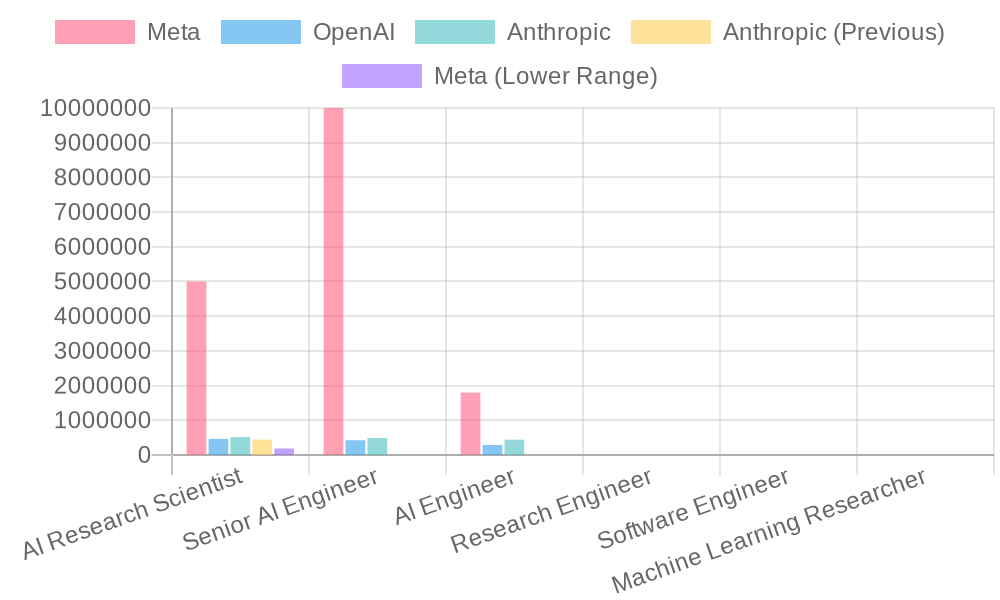In the rapidly evolving landscape of technology, the race for artificial intelligence talent has never been more intense. Companies like Meta are deploying aggressive recruitment strategies to attract the brightest minds in the AI field, significantly influencing the competitive dynamics of the industry. With offers soaring into the hundreds of millions, and some reports even citing figures above one billion for key personnel, it’s clear that Meta AI Recruiting is setting a precedent that smaller AI startups can only aspire to match.
As the tech race heats up, securing top-tier AI talent has become a crucial determinant of success. The implications of this scramble for skilled professionals extend beyond individual companies, reshaping the future of AI development itself. In this high-stakes environment, understanding the strategies employed by Meta and the resilience of AI startups is essential for anyone looking to comprehend the broader shifts within the tech industry and their societal impacts.
| Aspect | Meta | OpenAI | Anthropic |
|---|---|---|---|
| Recruitment Strategy | Aggressive outreach to top competitors | Collaborative and community-focused | Network through AI research conferences |
| Compensation Packages | Offers from $200 million to over $1 billion | Competitive, but less than Meta’s | Attractive, with equity options |
| Target Companies | Competing startups and established firms | Research labs and tech startups | Similar to OpenAI with a focus on cutting-edge firms |
| Culture | Fast-paced, results-driven | Open, inclusive, and creative | Safety-focused, aligned with ethical AI |
| Project Focus | Large scale AI integration | Innovative, consumer-friendly products | Safety and alignment in AI |


Implications of Meta’s Aggressive Recruitment Efforts
Meta’s recruitment strategies in artificial intelligence (AI) are changing the competitive landscape of the industry and raising important concerns. The substantial salary packages offered—sometimes exceeding $100 million in the first year—are intensifying competition for skilled professionals. This recruitment surge not only impacts job seekers but also affects startups and the overall speed of innovation in the AI sector.
Impact on the AI Industry and Competitors
Meta’s strong recruitment efforts show its intent to catch up with leaders like OpenAI and Google’s DeepMind. This has sparked a race for AI talent, forcing other companies to enhance their pay and retention strategies. Reports indicate that OpenAI is adjusting its compensation to keep pace with Meta. Furthermore, companies like Microsoft are actively looking to strengthen their AI teams by hiring talent from competitors.
Effects on Job Seekers
For job seekers, especially in AI, the intense competition has created a favorable environment. Senior researchers can now demand salaries over $1 million. This shift allows AI professionals to choose jobs based not only on pay but also on company culture and career growth potential.
Challenges for Startups
On the flip side, startups are facing significant challenges. With fewer resources, it’s tough for them to compete against Meta’s big offers. This talent drain could lead to a stagnation in innovation and diversity within the AI field. When expertise gathers in just a few large companies, smaller enterprises struggle to present new ideas and solutions.
Influence on Innovation
Although Meta’s recruitment aims to boost its AI strength, experts warn that such aggressive strategies may harm innovation diversity. When talent is concentrated in a few large firms, there may be a lack of varied research approaches, which are crucial for significant breakthroughs in AI. Moreover, relying on financial incentives can overshadow essential factors like research freedom and workplace culture that nurture true innovation.
In summary, while Meta’s aggressive recruiting offers great opportunities for job seekers, they also bring heavy challenges for startups and could hinder innovation and diversity within the AI community.
Key Findings on Meta’s Recruitment Efforts
- Intensified Competition: Meta’s large compensation packages are pushing rivals like OpenAI to rethink their hiring approaches.
- Salary Surge: AI professionals can now earn over $1 million as demand grows, especially for senior roles.
- Startups at Risk: Smaller AI firms are struggling to attract top talent due to Meta’s financial advantages, which may lead to stagnation in innovation.
- Diversity Impact: Concentrating AI talent in a few large organizations could reduce research diversity, affecting innovation quality.
- Long-term Implications: The changing recruitment landscape requires vigilance among industry stakeholders to ensure a diverse and balanced ecosystem that encourages creativity and innovation.
AI Tools Adoption Data
The adoption of AI tools such as ChatGPT and Llama 4 among enterprises has dramatically increased, showcasing the growing competition for talent in the AI sector.
ChatGPT Adoption Statistics
- Fortune 500: Approximately 92% of Fortune 500 companies have integrated ChatGPT into their operations, indicating a strong acceptance among large corporations. [Source]
- Enterprise use: As of March 2025, the number of ChatGPT Enterprise licenses surged to about 1.5 million seats, a tenfold increase over the previous year. [Source]
- Furthermore, 49% of surveyed companies are currently utilizing ChatGPT, with a significant 93% planning to expand its use in their operations. [Source]
Llama Model Adoption Statistics
- Download trends: Meta’s Llama models have been downloaded nearly 350 million times from platforms like Hugging Face, reflecting a tenfold growth in the past year. [Source]
- Cloud service usage: The hosted usage of Llama through major cloud service providers more than doubled between May and July 2024, with some providers reporting a tenfold increase in monthly usage during that window. [Source]
Implications on Competition for AI Expertise
- The demand for AI talent is escalating, with AI-related costs expected to surge by 36% in 2025, and average annual budgets for AI exceeding $1 million. This is largely driven by high salary expectations for AI professionals. [Source]
- Major tech companies, like Meta and Google, are engaged in fierce competition for talent, offering substantial signing bonuses and heavily investing in recruitment. [Source]
- Microsoft, for instance, has notably expanded its AI workforce by hiring 24 engineers from Google’s DeepMind, despite facing strict noncompete agreements. [Source]
These statistics underscore the transformative nature of AI technologies in business operations and the significant shifts in talent acquisition strategies within the tech industry. As firms race to harness AI capabilities, the demand for expert knowledge continues to surge, shaping the future landscape of technology and employment.

This chart illustrates the competitive landscape of AI hiring among leading companies like Meta, OpenAI, and Anthropic, showcasing the salary ranges for various AI positions in 2025.
Conclusion
In wrapping up the discussion on Meta’s aggressive recruitment strategy, it is evident that the implications are profound and multi-faceted. Meta AI Recruiting has not only intensified the competition for AI talent but has also set a benchmark that reverberates across the tech industry. The substantial financial incentives being offered—reaching into the hundreds of millions—underscore a pivotal moment in the AI talent landscape, directly impacting hiring practices and organizational strategies.
From the perspective of AI startups, the challenge has become increasingly daunting; they now face significant hurdles in competing against the considerable resources of larger players like Meta. The talent drain threatens innovation diversity, potentially homogenizing research priorities and stifling the creative solutions that stem from varied perspectives within the AI ecosystem.
Looking ahead, the continued monitoring of these trends in AI talent recruitment is crucial for understanding the future trajectory of the industry. As Meta’s influence grows, so too does the necessity for agile responses from startups and other companies striving to maintain their competitive edge. The dynamics of this recruitment race will inevitably shape the landscape of innovation and development in AI, leaving stakeholders to navigate the intricate balance between attracting talent and fostering an inclusive and diverse ecosystem.
Thus, as Meta AI Recruiting initiatives unfold, the broader AI community must remain vigilant—tracking shifts in recruitment practices and their long-term effects on the industry landscape. The ongoing evolution of talent recruitment in AI will ultimately define not just who holds the reins of technology today, but the shape of technological advancements for years to come.
Notable Quotes from Key Figures
Mark Zuckerberg, CEO of Meta
-
Quote: “We want to bring the best people to Meta, and we would love to share more about what we are building.”
- Context: This statement reflects Meta’s ambition to position itself as a leader in AI technology by recruiting top talent. It highlights the company’s commitment to developing innovative AI solutions and showcases their transparent approach, aiming to foster a collaborative environment.
Mira Murati, Chief Technology Officer at OpenAI
-
Quote: “The pressure has always been there since the start of this year.”
- Context: Murati’s observation underscores the increasing competitive pressure that AI companies face, especially from larger firms like Meta that are aggressively hiring. It emphasizes the urgency for companies to secure top talent as the race for AI supremacy accelerates.
Alexandr Wang, CEO of Scale AI
-
Quote: “Not everyone is keen to work for Wang.”
- Context: This quote hints at the unique challenges faced by startups in attracting talent compared to established giants like Meta. Wang’s candid remark points to the higher stakes and the dynamic nature of recruitment in the tech industry, where reputation and compensation play crucial roles.
Andy Stone, Director of Communications at Meta
-
Quote: “Our vision for the future requires the brainpower of the best minds in AI.”
- Context: Stone’s remark articulates Meta’s forward-looking strategy in talent acquisition, emphasizing the importance of skilled professionals in achieving their ambitious goals in AI development. This focus on visionary leadership highlights the company’s long-term investment in technology and innovation.
Nat Friedman, Former CEO of GitHub
-
Quote: “The new landscape of AI recruiting demands unprecedented financial commitments.”
- Context: Friedman’s comment reflects the financial realities of the AI hiring environment, indicating that companies are willing to invest staggering amounts to attract talent. This illustrates the shift in recruitment strategies as financial incentives become a pivotal factor in attracting skilled individuals.
In summary, these quotes not only reveal the perspectives of industry leaders but also contextualize the ongoing battle for AI talent within a competitive framework. Their insights shed light on the challenges and expectations that shape recruitment strategies, influencing the future landscape of technology and artificial intelligence.

Key Meta Recruitment Facts
- Lucrative Packages: Meta’s recruitment offers for top talent range from $200 million to over $1 billion, ensuring they attract the best in AI research and development.
- Targeted Companies: The recruitment efforts aggressively target over a dozen staffers from companies like Thinking Machines Lab, as well as smaller startups and established tech firms.
- Historical Seed Funding: Thinking Machines Lab, a significant target for Meta, recently raised the largest seed round in history, reflecting its valuation at approximately $12 billion.
- Notable Hires: There has been strategic poaching of talent across the industry, with Meta seeking to acquire high-profile AI professionals currently employed at competing firms.
- Expansion in Headcount: Meta has significantly increased its AI team, contributing to the broader talent war that has seen many companies recalibrating their recruitment strategies to compete effectively.
- AI Ecosystem Impact: The aggressive hiring practices by Meta are reshaping the competitive landscape of AI talent recruitment, leading to both opportunities and challenges for startups as they strive to attract talent amidst rising salary expectations.
- Cultural Shifts: The influx of financial incentives in recruitment is also influencing workplace culture, leading to a focus on results-oriented environments at companies like Meta, which may overshadow other critical factors such as innovation and employee satisfaction.
These insights provide a clearer picture of Meta’s ambitious strategies in the AI talent recruitment race, illustrating how they are not only shaping their internal workforce but also influencing the industry as a whole.

